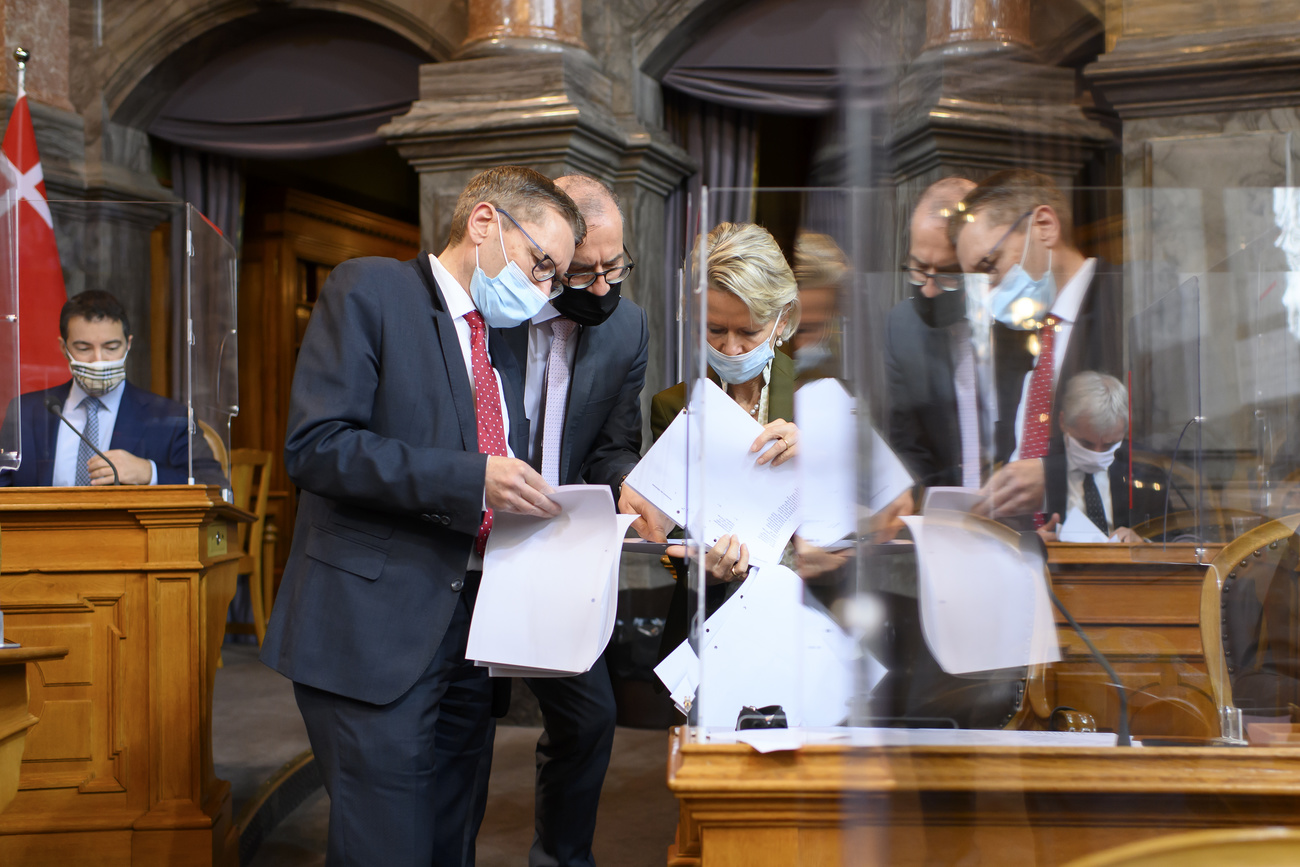
Poll finds majorities for climate strategy and pesticide bans

Parliament’s climate strategy appears to enjoy solid support among Swiss citizens ahead of next month’s nationwide vote on the CO2 law.
Supporters of two anti-pesticide initiatives also have the upper hand in an opinion poll published on Friday. It was commissioned by the Swiss Broadcasting Corporation (SBC), SWI swissinfo.ch’s parent company.
A total of five issues are on the ballot sheet on June 13, including the government’s economic measures to cope with the Covid-19 pandemic as well as a law to boost police powers to combat terrorism.
Supporters of the amended CO2 law currently have a 25-percentage point lead, with the campaign still to get into full swing.
Political scientist Martina Mousson, project leader of the GfS Bern research institute which carried out the survey, says citizens and various interest groups have by and large formed their opinion. But all is not lost for opponents.
“It appears that the law will win endorsement, but at this stage I don’t rule out rejection by voters at the ballot box,” she says.
The pollsters found a clear split between right-wing and left-wing political parties. Middle-class voters could sway the outcome, they say.
Currently there are no majorities in any of the subcategories examined: age, gender, income, language region or type of residential area. But Mousson says opponents of the amended CO2 law have successfully got their message across to the public about planned price hikes for heating, petrol or plane tickets.
Some opposition is also to be expected from the younger generation with a heightened environmental sensibility as the law does not go far enough in their opinion, the poll found.
Anti-pesticide
The goals of the two initiatives targeting the use of pesticide in agriculture are shared by many respondents. They both currently have a majority.
But the margin is not very comfortable for supporters, notes Lukas Golder, co-director of the GfS Bern research institute. As a rule, a people’s initiative (a proposal for an amendment of the constitution launched by groups outside parliament) loses support in the run-up to voting day.
“We don’t expect the two initiatives to be exceptions to the rule,” he says.
The political left, parts of the centre and parts of the farming community have come out in favour, but the political right and key players among the centrist groups and the main farmers’ association are outspoken critics. Even the interest groups representing organic agriculture are divided.
Pollsters have identified only a few differences in the perception of the two initiatives in the early stages of campaigning.
But given the emotional potential of the issue, both for Swiss society with its rural roots and as a trend in Western societies, the debates could become more heated and possibly also more nuanced in the weeks to come, Golder said.
The research team found a markedly higher approval rate for both initiatives among the expat Swiss community compared with Swiss residents.
Anti-government
Considerable potential for spicy verbal exchanges could be expected in the vote on the government’s policy in dealing with the Covid-19 pandemic.
The current figures seem to leave little doubt that voters will back the government. Mousson says the chances of turning the trend around in favour of government critics are indeed fairly limited – but not impossible.
“The dynamics of the campaign are difficult to predict and there’s a good deal of controversy about the government’s anti-Covid measures,” she says.
The groups trying to veto the law include general critics of the government and sceptics of the vaccination policy. They also accuse the federal government of power grabbing at the expense of cantonal authorities and other interest groups and institutions.
Extended police powers to combat terrorism are at the centre of a legal amendment to come to vote on June 13. A solid majority says it supports the reform which have been challenged by the political left.
“It’s unlikely to be the key issue,” Golder says. “It’s possibly also seen as a complex issue and citizens still have confidence in the government.”
A protest vote is not to be expected, he says. But he refuses to read the poll result as a foregone conclusion.
A second SBC-commissioned poll about all five issues on the ballot sheet will be published in early June.
Pollsters interviewed 22,732 Swiss citizens from all language regions across the country and among the expatriate Swiss community for the first of two nationwide surveys.
The survey is based on online responses as well as telephone interviews, both with fixed line and mobile phone users. It was carried out from April 19 to May 3.
The margin of error is 2.8%.
The poll was commissioned by the Swiss Broadcasting Corporation (SBC), SWI swissinfo.ch’s parent company, and was carried out by the GfS Bern research institute.

In compliance with the JTI standards
More: SWI swissinfo.ch certified by the Journalism Trust Initiative









































You can find an overview of ongoing debates with our journalists here . Please join us!
If you want to start a conversation about a topic raised in this article or want to report factual errors, email us at english@swissinfo.ch.